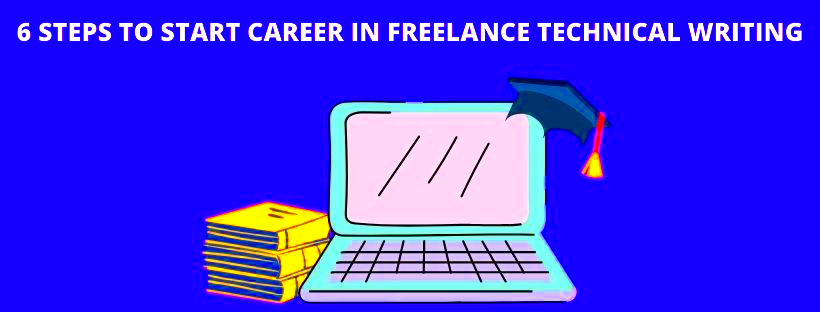Freelance technical writing is a growing field that offers flexibility, variety, and the chance to work from anywhere. It involves creating clear and concise documents, such as manuals, user guides, and online help content, aimed at helping people understand complex topics. Whether it's explaining software features or how a product works, a technical writer's role is to make sure that information is easy to follow and accurate. If you enjoy writing and have a knack for simplifying complicated concepts, this could be the perfect freelance career for you.
Why Choose Technical Writing as a Career?

Choosing technical writing as a career offers several advantages, especially for those who are detail-oriented and enjoy problem-solving. Here are some reasons why it's a great choice:
- High Demand: With the growth of technology and the increasing need for user-friendly documentation, technical writing is in high demand across various industries.
- Good Pay: Technical writers often earn competitive salaries, especially as they gain experience or specialize in certain fields like software or medical writing.
- Work Flexibility: As a freelancer, you can choose your clients, projects, and work hours, offering a good work-life balance.
- Variety of Work: From writing manuals to creating online tutorials, you can work on a wide range of projects that keep the work interesting.
- Job Security: With businesses constantly updating and improving their products, there's always a need for technical writers to document these changes.
Also Read This: Is Fiverr.com Down? Hereâs How to Check and Troubleshoot
Skills Required to Become a Freelance Technical Writer

To succeed as a freelance technical writer, you need a combination of writing skills, technical knowledge, and the ability to break down complex concepts. Here are some essential skills:
- Strong Writing Skills: The foundation of technical writing is clear and concise writing. You need to communicate complex information in a simple, easy-to-understand way.
- Technical Understanding: You don’t have to be an expert, but a basic understanding of the technical topics you're writing about is essential. This could range from software development to engineering concepts.
- Attention to Detail: Accuracy is crucial in technical writing. Even a small error can lead to confusion, so it's important to be detail-oriented.
- Research Skills: You'll often need to research topics to ensure the information you provide is correct and up-to-date.
- Familiarity with Tools: Knowledge of tools like Microsoft Word, Adobe FrameMaker, or even specialized software like MadCap Flare is important for creating professional documentation.
- Communication Skills: As a freelancer, you will be working with clients and subject matter experts. Being able to communicate effectively is key to understanding their needs and delivering high-quality work.
Also Read This: How to Make a Seller Profile on Fiverr
Steps to Start Your Freelance Technical Writing Career

Starting your freelance technical writing career can feel like a big step, but with a clear plan, you can make it happen. Follow these steps to get started:
- Step 1: Learn the Basics of Technical Writing – If you're new to technical writing, begin by understanding the fundamentals. There are many online courses and resources that can teach you the essentials of clear, concise writing, as well as the different types of technical documents you'll create.
- Step 2: Build Relevant Skills – Familiarize yourself with tools commonly used in the industry, such as word processors, graphics tools, or specialized software. Learn how to organize content effectively and master the art of simplifying complex concepts.
- Step 3: Gain Experience – Start small by writing for friends, volunteering, or taking on low-paying gigs. Gaining experience, even if unpaid initially, will help build your confidence and improve your portfolio.
- Step 4: Create a Portfolio – Once you've gained some experience, put together a portfolio showcasing your best work. Potential clients want to see examples of your writing to evaluate your skills and expertise.
- Step 5: Market Yourself – Create an online presence, whether it’s a professional website, LinkedIn profile, or social media. You can also network within online forums and communities where technical writing jobs are discussed.
- Step 6: Apply for Freelance Jobs – Use platforms like Fiverr, Upwork, or specialized job boards to find freelance gigs. Be prepared to tailor your proposals and showcase your portfolio when applying.
Also Read This: How to Market Your Freelance Work
Building a Strong Portfolio as a Technical Writer

Your portfolio is your key to getting clients as a freelance technical writer. It should highlight your skills, experience, and the types of projects you can handle. Here’s how to create a strong one:
- Include a Range of Projects: A strong portfolio shows versatility. Include samples like user guides, manuals, API documentation, and other technical content. The more varied your samples, the more appealing your portfolio will be to potential clients.
- Showcase Your Writing Style: Clients want to see how well you write, so choose your best pieces to show off your clarity, precision, and ability to simplify complex information. Make sure your samples are polished and error-free.
- Organize Your Portfolio: Make your portfolio easy to navigate. Group similar documents together and provide clear descriptions of each project, including the tools used, the target audience, and the purpose of the document.
- Include Case Studies or Testimonials: If you have past clients or projects, ask for testimonials or create short case studies that describe how you solved a specific problem for a client. This can help build trust with potential clients.
- Keep It Updated: Your portfolio should grow with your career. Keep it updated with your latest work, and remove outdated samples that no longer reflect your current skill level.
Also Read This: Where Do Your Saved Gigs Go in Fiverr?
Finding Freelance Technical Writing Jobs
Once you’ve built your portfolio and are ready to start looking for jobs, there are several ways to find freelance technical writing gigs:
- Use Freelance Platforms: Websites like Fiverr, Upwork, and Freelancer are popular platforms where you can find clients looking for technical writers. Create a compelling profile, post your services, and apply to relevant job postings.
- Network in Online Communities: Join technical writing groups on social media platforms like LinkedIn or specialized forums. Engage in discussions, share your expertise, and let people know you’re available for work.
- Reach Out to Companies: If there’s a specific company or industry you want to work with, don’t hesitate to reach out. Send a polite email introducing yourself and highlighting how your services can help their documentation needs.
- Look for Job Boards: There are job boards specifically for technical writing, such as WritingJobz or TechWhale, which list freelance and full-time positions.
- Use Your Existing Network: Let your friends, family, and professional contacts know you’re available for freelance work. Word of mouth can be a powerful tool in finding new opportunities.
- Cold Outreach: Research businesses or organizations that might need your services and send a pitch email offering your technical writing expertise. Many businesses may not advertise positions, but they may need help with documentation.
Also Read This: How Does Fiverr Pay in Pakistan?
Managing Your Freelance Technical Writing Business
Running your own freelance technical writing business goes beyond just writing documents. It requires organization, time management, and good business practices. Here's how you can manage your freelance career effectively:
- Set Clear Goals: Establish both short-term and long-term goals for your freelance business. These might include earning a specific income, building a certain number of client relationships, or mastering a new technical skill.
- Manage Your Time: Time management is key. As a freelancer, you need to balance writing with administrative tasks like invoicing, client meetings, and marketing your services. Use tools like calendars or time-tracking apps to stay organized.
- Create Contracts: Always work with a contract in place. A contract will clarify expectations, deadlines, and payment terms with clients, reducing the chances of misunderstandings.
- Set Your Rates: Determine your rates based on your skills, experience, and industry standards. Don’t be afraid to raise your rates as you gain more expertise and a strong client base.
- Track Finances: Keep track of your income and expenses. You might want to use accounting software to make sure everything is organized for tax purposes. Also, plan for irregular income by saving for lean periods.
- Keep Learning: Stay updated with industry trends and continually improve your writing and technical skills. This will help you stay competitive and offer high-quality services to your clients.
Also Read This: Who Runs Fiverr: A Look Behind the Success of the Freelance Marketplace
Frequently Asked Questions (FAQ)
Here are some common questions about starting and managing a freelance technical writing career:
- Do I need a degree to become a technical writer? – While having a degree in English, Communications, or a technical field can help, it's not a strict requirement. Many successful technical writers have learned through experience and self-study.
- How do I find clients as a freelance technical writer? – You can find clients on platforms like Upwork, Fiverr, or through direct outreach to companies. Networking and building a strong online presence can also help.
- How much can I earn as a freelance technical writer? – Earnings vary depending on your experience, niche, and the clients you work with. As a beginner, you may start at a lower rate, but with experience and a solid portfolio, you can earn a competitive salary.
- What types of documents do technical writers create? – Technical writers create user manuals, help guides, software documentation, API documentation, and more. The focus is always on making complex information accessible to users.
- How do I handle revisions or client feedback? – Be open to feedback and revisions. It's a normal part of the freelance process. Ensure you communicate deadlines and expectations with clients to minimize revisions.
Conclusion
Starting a freelance technical writing career can be a rewarding experience if you approach it with the right mindset and tools. By focusing on building your skills, creating a strong portfolio, and managing your business effectively, you can set yourself up for long-term success. Remember, the freelance world offers flexibility and variety, but it also requires dedication, good time management, and continuous learning. So, take the first step today, and embrace the opportunities that freelance technical writing has to offer!




